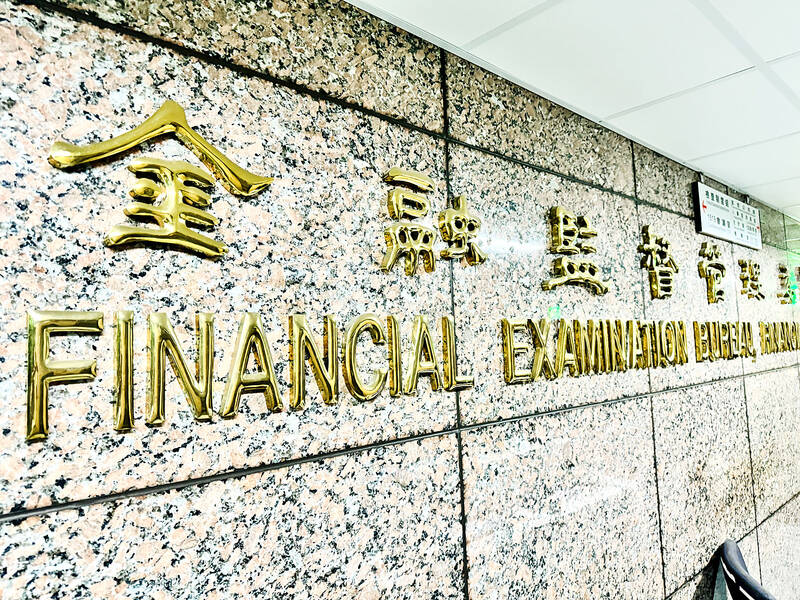Offshore operations of the local financial sector reported a more than 14 percent fall in pretax profits from a year earlier in the first seven months of the year, as high US dollar interest rates boosted their costs, the Financial Supervisory Commission (FSC) said last week.
The combined pretax profits of offshore banking units (OBUs), offshore insurance units (OIUs) and offshore securities units (OSUs) totaled US$989 million, down 14.5 percent from a year earlier, data compiled by the commission showed.
Pretax profits posted by OBUs totaled NT$32.12 billion (US$1 billion), down 12.6 percent from a year earlier, the commission said.

Photo: Kelson Wang, Taipei Times
After an aggressive rate hike cycle by the US Federal Reserve last year, interest levels in US dollar-denominated assets have stayed high, which pushed up costs of interbank lending shouldered by OBUs, Banking Bureau Deputy Director-General Phil Tung (童政彰) said.
In the first seven months, the balance of deposits received by OBUs rose to NT$3.67 trillion, up 2.9 percent from a year earlier, and the balance of lending totaled about NT$2.40 trillion, up 7 percent year-on-year with the average deposit-to-lending ratio at 65.3 percent, the commission said.
However, the highest interest income due to a rate hike cycle in the US allowed OIUs to increase their interest income, Insurance Bureau Deputy Director-General Tsai Huo-yen (蔡火炎) said.
The combined pretax profits of OIUs was US$16 million, representing a 10.6-fold increase from a year earlier at a time when OIUs of life insurance companies, non-life insurance firms and re-insurers saw their profitability continue to improve, the commission said.
The increase also came from a relatively low comparison base last year as insurance companies had to pay massive compensation to insurance policyholders due to climate change, Tsai said.
However, the number of insurance contracts sold by OIUs in the first seven months fell 18.1 percent year-on-year to 416, with premium income plunging 87.9 percent to US$3 million, the commission said.
The sharp drop in the number of new contracts and premium income reflected caution among OIUs which appeared reluctant to sign a large number of new contracts after paying huge compensation last year, Tsai said.
Many OIU clients terminated their contracts ahead of schedule or declined to renew their contracts, Tsai said.
Combined pretax losses for OSUs were less than US$3 million, down almost US$10 million from a year earlier, the commission said.
The improvement showed many securities firms parked their funds in bonds commanding higher yields after their previous bond investments matured, Securities and Futures Bureau Deputy Director Kao Ching-ping (高晶萍) said.

NEW IDENTITY: Known for its software, India has expanded into hardware, with its semiconductor industry growing from US$38bn in 2023 to US$45bn to US$50bn India on Saturday inaugurated its first semiconductor assembly and test facility, a milestone in the government’s push to reduce dependence on foreign chipmakers and stake a claim in a sector dominated by China. Indian Prime Minister Narendra Modi opened US firm Micron Technology Inc’s semiconductor assembly, test and packaging unit in his home state of Gujarat, hailing the “dawn of a new era” for India’s technology ambitions. “When young Indians look back in the future, they will see this decade as the turning point in our tech future,” Modi told the event, which was broadcast on his YouTube channel. The plant would convert

‘SEISMIC SHIFT’: The researcher forecast there would be about 1.1 billion mobile shipments this year, down from 1.26 billion the prior year and erasing years of gains The global smartphone market is expected to contract 12.9 percent this year due to the unprecedented memorychip shortage, marking “a crisis like no other,” researcher International Data Corp (IDC) said. The new forecast, a dramatic revision down from earlier estimates, gives the latest accounting of the ongoing memory crunch that is affecting every corner of the electronics industry. The demand for advanced memory to power artificial intelligence (AI) tasks has drained global supply until well into next year and jeopardizes the business model of many smartphone makers. IDC forecast about 1.1 billion mobile shipments this year, down from 1.26 billion the prior

People stand in a Pokemon store in Tokyo on Thursday. One of the world highest-grossing franchises is celebrated its 30th anniversary yesterday.

Zimbabwe’s ban on raw lithium exports is forcing Chinese miners to rethink their strategy, speeding up plans to process the metal locally instead of shipping it to China’s vast rechargeable battery industry. The country is Africa’s largest lithium producer and has one of the world’s largest reserves, according to the US Geological Survey (USGS). Zimbabwe already banned the export of lithium ore in 2022 and last year announced it would halt exports of lithium concentrates from January next year. However, on Wednesday it imposed the ban with immediate effect, leaving unclear what the lithium mining sector would do in the